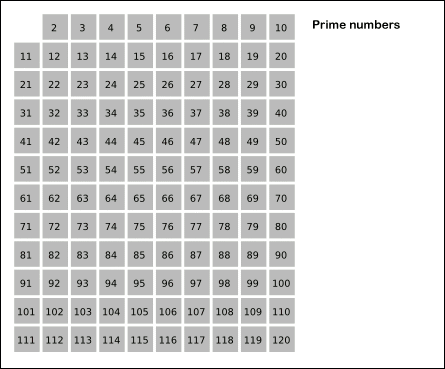Prime Number
Tags: Algorithm
Intro
Approach 1 gives the method to test whether n is a prime number.
Approach 2 gives the method to test whether numbers in a given range are prime numbers.
Approach 1
A prime number (or a prime) is a natural number greater than 1 that is not a product of two smaller natural numbers (except 1).
-
According to the definition, I iterate the pt from 2 to n to see if n is a prime number by testing pt is a factor of n.
-
However, I could narrow the possible range of pt from 2 to n/2, which the smallest possible factor of n is 2. For the same reason, 3 is the second smallest possible factor of n.
-
I could further simplify the range of pt because the biggest possible factor of n is sqrt(n) (a larger factor of n must be a multiple of a smaller factor that has been already checked).
Code
class Solution {
// Approach 1: Simple way
public boolean isPrime(int n) {
if (n <= 1)
return false;
// Check from 2 to sqrt(n)
for (int i = 2; i <= Math.sqrt(n); i++)
if (n % i == 0)
return false;
return true;
}
}
Approach 2

Sieve of Eratosthenes is an ancient algorithm for finding all prime numbers up to any given limit.
-
First, assuming every 2k+1 number is prime number in the given range.
-
Secondly, marking the frontest number which is currently prime (named i) as prime number and every i*c (c is N) number as non-prime
-
Third, simplifying the range of i*c => i*2c because every even c is non-prime. Then, start calculating from i*i instead of i*1 because i*1 to i*(i-1) is checked before.
Code
class Solution {
// Appraoch 2: Sieve of Eratosthenes
public boolean[] isPrime(int n) {
if (n <= 2) return 0;
boolean[] isPrime = new boolean[n];
for (int i=3; i<n; i+=2) {
isPrime[i] = true;
}
isPrime[2] = true;
for (int i=3; i<Math.sqrt(n); i+=2) {
if (isPrime[i]) { // if i is prime
for (int j=i*i; j<n; j+=i*2) { // mark i*i, i*(i+2), i*(i+4),... as non-prime, which i=2k+1
isPrime[j] = false;
}
}
}
return isPrime;
}
}
